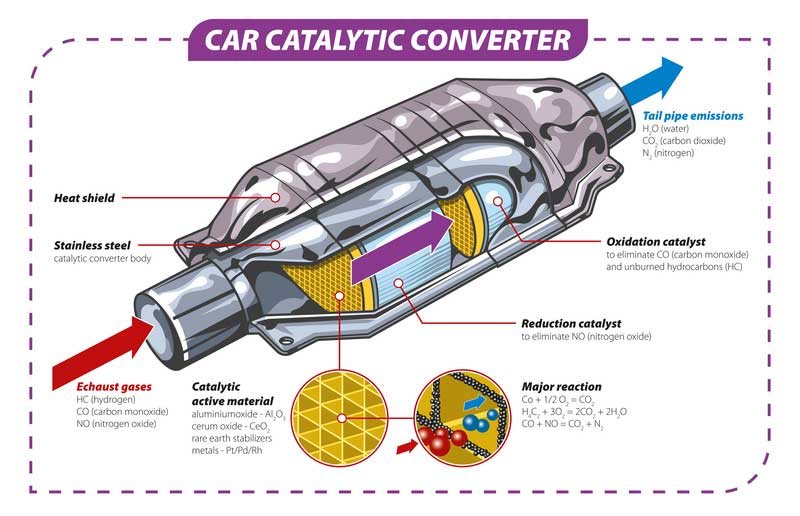What problems do aftermarket catalytic converters have?
Aftermarket catalytic converters tend to have at least 3 major problems that car buyers need to be aware of before making their purchase, including the following:
Contents
1. Rusts at a much faster rate
The aftermarket catalytic converter tends to rust at higher rates. This is primarily because of the substandard metal materials that they are made of.
Unlike OEM parts, the materials are composed of higher-grade precious metals that last longer and have a much higher resell value.
2. Bad welds
Another common problem that aftermarket catalytic converters are known for is bad welds. Bad welds can lead to significant problems in the long run. For instance, the lack of durability and integrity of these products can easily be seen when inspected (i.e. lack of uniformity, discoloration of the parent metal, width is too thin, and cracks down the center of the bead).
3. Aftermarket parts may not fit at all – Costly Adjustments Required
The aftermarket catalytic converter may or may not fit the car that you are purchasing the part. Unlike the OEM part that fits perfectly upon arrival, aftermarket catalytic converters may need to be adjusted before they can be installed.
The total cost of replacing a catalytic converter may cost much more if serious adjustments need to be made.
It is also important to note that the standards that Original Equipment Manufacturers (OEM) are subject to are vastly different from Aftermarket Manufacturers.
So, the quality and the composition of the parts are usually sub-par, and why the prices are much lower.
And, for this reason, if you are considering buying an aftermarket catalytic converter instead of an OEM part, you need to know the distinctions between each and the total cost involved before making your purchase.
Benefits of an aftermarket catalytic converter
Now that you are familiar with some of the significant problems that exist with aftermarket catalytic converters, you should also be aware of the upsides, too.
Even though these problems may cause you to think twice about making this purchase, there are some advantages to buying an aftermarket catalytic converter for your vehicle. Some of the most commonly known and beneficial are listed below.
Cheaper Price: Saves Money
Replacing the catalytic converter in most vehicles is not cheap. The average price can range from $945 to $2475 to pay for the parts and the labor. So, the cost that you pay may be close to the present book value of your vehicle or more.
Thus, to cut down on the cost, the aftermarket catalytic converter may be the cheaper option.
Older Model Cars: Most Suitable Option
The decision that you make can vary based on several different factors, including the age of the vehicle that needs to be repaired. This is especially the case for those of you who are driving older model vehicles.
For instance, if you are driving an older model vehicle that is only expected to last for 5 years or less, the aftermarket catalytic converter may be more suitable for your needs.
Since the lifespan of an aftermarket catalytic converter is about 5 years, you can minimize the risk and save money at the same time.
On the other hand, if you have a newer model car that is 5 years or younger, the OEM catalytic converter may be a better option for you. This is mainly because an OEM part is designed to last for the life of the vehicle.
Gives you more Options: Not Forced to Buy OEM Only
Aftermarket manufacturers provide car owners with more than one option to replace these parts. Therefore, the car owner is not forced to buy OEM parts only. You can save money on the cost of these repairs if you choose to do so.

Conclusion
Replacing a catalytic converter can be a very costly expense. This is why some car owners may consider buying an aftermarket catalytic converter instead of its OEM counterpart.
However, before buying an aftermarket catalytic converter, it is best to do your homework first, especially since there are problems in its overall composition (i.e. bad welds, rusts faster, and adjustments required for proper installation).
But then again, some benefits need to be factored in as well. The price of an aftermarket catalytic converter is cheaper and may be the best fit for older model cars.
